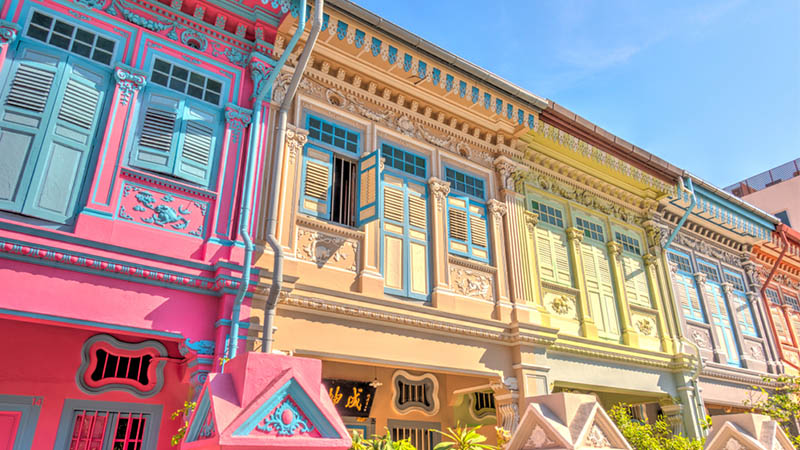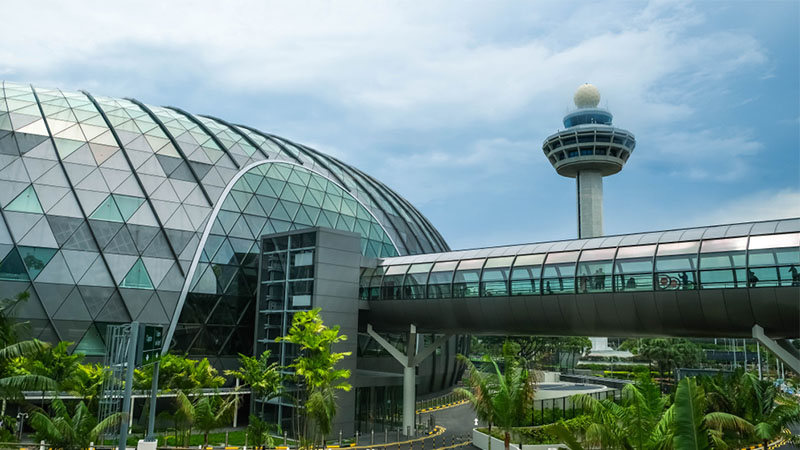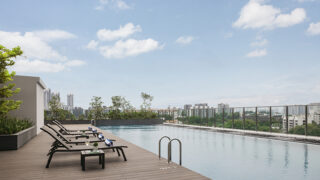Fancy living in Singapore? Here’s a whole lot of information that will – we hope! – help you make a more informed decision about coming here. Moving to Singapore means different things for different people, but the usual suspects are better career chances, warm weather, a safe and clean place to live, and interesting food! There are plenty of things to do, and masses of articles, advice and info on our website. Plus, if you’re a new expat in Singapore – or even an “old hand” – our annual City Guide and Kids’ Guide offer plenty to read about to make the most of living here.
Sitting comfortably? Then we’ll begin!
Singapore fact file
Population: 6.05 million
Area: 721 square kilometres over 63 islands
Rank in size in world countries: 190th
Rank in population density: 2nd
Distance from equator: 137km
Ethnic makeup: 74% Chinese, 13% Malay, 9% Indian
Religions: 33% Buddhist, 19% Christian, 14% Muslim, 5% Hindu, 17% no religion
Official languages: Mandarin, Malay, Tamil, English
Life expectancy: 83 years

Things to consider before moving to Singapore
We asked some expats in Singapore to give us some feedback, and they’ve touched on plenty of considerations below. From our own perspective, climate always seems to be a talking point, but whether you love it or hate it, at least it’s consistent and you know what to expect! The other one is cost of living. What you pay for your groceries, for example, or rental costs can give you a bit of a shock at first, especially on the back of recent inflation rises.
What other expats think about living in Singapore:
“Living here has opened up a whole new world for me. The social scene is lively and it’s fairly easy to make friends. I also love that Singapore is a great hub for travel. We can get to beautiful remote islands in a matter of hours, and visit parts of the world I would never have experienced if we didn’t make the move here, such as Cambodia and Borneo. However, sometimes I feel like we live in an expat bubble and don’t fully integrate into the local society. I’ve lived here twice; the first time I didn’t even make any local friends. This time, I’ve done a much better job of meeting locals and that makes me a lot happier. I feel less removed this time around.” – Jennifer
“In Singapore, we can enjoy the privilege of living in a society that is well ordered and safe. Public services tend to function successfully; buses and trains run on time, reported crime is low, healthcare in clinics and hospitals is of a high standard, and the public areas are well maintained with many pavements sheltered from the elements. Singapore is a fantastic base for short-haul travel around Southeast Asia, if you have the time and resources to make the most of it. As for the negative: how do you feel about lizards, not to mention ants and cockroaches? After nearly eight years in Singapore, I still haven’t quite accepted that lizards appear to have the right to surprise me in my home at any time, from behind curtains, inside cupboards and under the toaster!” – Kate
“One of the best things about being an expat here is the variety of other expats you befriend along the way. Our peer group consists of friends from all over the world: Singapore, Italy, South Africa, Australia, the UK, America, Japan and more! The expat community here is also very welcoming. Wherever you go and whatever you get involved with, you can very quickly make friends. One negative? The ‘expat tax’ can be a bummer. I have lived in Singapore a long time and there are times I know I am charged more for things – services mostly – because I’m an expat.” – Kristen
“Singapore has good weather. It’s a great place to make friends and for families to live in. One negative aspect is that it’s not that easy to find work.” – Firuza
“Travelling around the region is without a doubt the best part. You can see and experience so much from here. The ‘work hard, play hard’ culture is really fun! One negative aspect: customer service can leave a lot to be desired.”
– Emer
“My two kids have been raised in Singapore and the environment has been outstanding. The friends we have made over the years have been gold. One negative is the lack of any variability in temperature.” – Tony
“Safety! As a positive aspect, that occupies the top ten spots if you are moving here with kids. As far as negative aspects go, some people could find life here a bit sterile.” – Geeta
Pros and cons of expat living in Singapore
There are many things about living in Singapore that make it an attractive place to relocate with family – low crime rate, high standard of living, great schooling options, and one of the most efficient healthcare systems in the world. However, as with moving to any country, there are balancing factors that may need extra consideration. Here are four that are frequently mentioned by newly settled expats and old hands alike.
#1 The climate can be taxing
Due to Singapore’s close proximity to the equator, the country experiences year-long summers with average temperatures of 24 to 34 degrees Celsius. While you may enjoy the warmth and sunny days – particularly those who’ve come from much colder climes – bear in mind that the heat can bring additional risks to your health. Common heat-related illnesses to watch out for include heat stroke, dehydration and sunburn, while the conditions can also be conducive to illnesses such as food poisoning.
#2 Living in Singapore expenses
The high standard of living in Singapore can come at a price. You’ll find, for example, that living your life here under similar conditions to those you’ve enjoyed in your home country can really eat into your money. Property costs are among the highest in the world, for one thing! And, if you enjoy kicking back with a pint of beer or a glass of wine over the weekend, you’ll need to take account of the relatively high alcohol tax.

#3 It’s expensive to raise a family
If you have children or plan on starting a family when you move to Singapore, be aware of how much you might spend on this. The cost of raising a child depends on a wide range of factors, including where you deliver your baby, where your child goes to school, extracurricular activities, childcare and healthcare. One estimate from Today Online puts the cost of raising one child up to the age of 21 years at between S$200,000 and S$1 million!
To offset some of the expenditure, find out if you’re eligible for tax relief and rebates. The main options here include:
- Parenthood Tax Rebate
- Qualifying Child Relief and Handicapped Child Relief
- Working Mother’s Child Relief
- Foreign Maid Levy
#4 Healthcare in Singapore
You’ll be in good hands with Singapore’s healthcare system; it ranks among the best in the world. Basic healthcare at public hospitals is affordable and sometimes even free for Singaporean citizens. Permanent residents (PRs) and Singaporean citizens have access to Medishield Life, a basic health insurance plan designed to offset large hospital bills and expensive outpatient treatments like kidney dialysis. Foreigners, including those on Employment Passes, are not eligible for this, and without subsidisation the prices can be hefty, especially at private facilities. For example, a private GP visit can set you back as much as $200.
A few essentials for living in Singapore
As a starter, here are some important numbers – from help lines and emergency numbers to business organisations, churches, taxis and more.
We’ve also got a huge list of relevant apps to assist you with everything from getting around to finding the best restaurants, doing business and making the most of your leisure time.
And here all the details you need for getting around Singapore, including info on the cheap and reliable public transport network, along with everything you need to know about taxis … and more!
Working in Singapore
Getting a work pass
You’ll need a work pass (work visa) to get on the payroll in Singapore, and recent changes by the MOM have added extra complexity around this for expats.
The Fair Consideration Framework allows affirmative discrimination and employers are required to consider Singaporeans fairly before hiring Employment Pass (EP) holders. A quota system regulates the ratio of foreign and local workers in the workplace.
Dependant’s Pass holders used to be entitled to work after obtaining a Letter of Consent (LOC), which their employer applied for – a relatively easy process. However, LOCs for DP holders were phased out from 2021. You’ll now need to apply for an EP or a S Pass instead – and it’s more complicated. For one thing, there are qualifying salaries, a strong emphasis on educational background, and a requirement to work full-time hours.
To check your likelihood of obtaining an EP or S Pass, use the MOM’s online Self-Assessment Tool.
Tips for getting a job
Here are five fundamental steps an expat in Singapore can take to improve their chances of nailing down a job.
#1 Have all your official documents including birth certificates, personal identification and university transcripts at the ready – Singapore-based employers will likely ask for these and you may need to provide original copies. They may also ask for a photograph with your CV.
#2 Make sure your LinkedIn profile and CV are both up to date. Your LinkedIn profile is a marketing advertisement for you, so it needs lots of appeal – and it also needs keywords that HR or recruiters may use when searching for candidates in your space. Your CV, meanwhile, should be short and simple (two pages is ample) – but scatter it with appropriate keywords too.
#3 See which recruiters are specialists in your field and go straight to them (via LinkedIn, for example); then find out which companies are posting jobs you’re interested in and get in touch. You’ll have a much better chance of breaking through the noise if someone has identified you as suitable talent.
#4 Spend time searching for a job every day until you get one. Searching can be a full-time job in itself – just stay determined and active. Be realistic about salary, too – remember that Singapore’s low tax rate will often offset a lower base salary.
#5 Attend interviews or take Zoom calls even if you’re not 100 percent sure you want the position. Many companies can create roles for the right person, but they have to meet you first.

Where to live in Singapore
Right, here’s some more of the really important stuff! Presuming you have a job and you’re ready to go, you’ll need a place to call home. Our full guide to the different neighbourhoods is here: Where to live
In the meantime, though, here’s a quick breakdown of the areas to consider, below.
- Orchard: Orchard Road, Tanglin, Holland Village, Novena, Central Bukit Timah
- City: Robertson Quay, Mohammed Sultan Road
- West: Upper Bukit Timah, Jurong
- South: Sentosa, Faber Park, Pasir Panjang
- North: Woodlands, Seletar, Yishun
- Central: Thomson, Braddell, Serangoon
- East: Katong, Siglap, Bedok, Tampines
When making your choice, take into consideration where you will work, and where school will be (if you have kids). It mightn’t seem far away on the map, but you need to take into account the rush-hour traffic. And remember, if you’re locked into a standard rental lease in Singapore, you will be stuck with that route for the next two years!
Kids
Schooling is a hot topic for expat parents. Should you try for a spot in a local school or enrol your child in an international school in Singapore? To hear from parents, students, teachers and more on a whole bunch of schools in Singapore, take a look at these links:
And to find out some of the factors why EL readers chose their particular family schools, see these comments from our annual City Guide.
“We chose private schooling for our children. I grew up in Asia and went through the Asian schooling system. While the academic rigour is amazing, I found it to be quite stressful as a child. I wanted my children to enjoy their primary school years and learn in a more experiential and play-based environment.” – Cherie
“Our kids go to a local preschool where they use the Montessori method – they go by public bus with my helper. One of the most important things when we were looking for a school was outdoor space; there’s a nice garden around the school building where they have a small playground and sand pit.” – Emőke
“International schools can be expensive in Singapore, but there are schools that still cover the curriculum at a more reasonable price. So the choice will depend on the parents’ finances and how the kids are suited to a school.” – Richard
“We’ve experienced both educational systems. Our girls attended local schools during their primary years, and then we transitioned them to an international school. While the local school offered a strong academic structure, the international school provided a more holistic approach to education. Our children have benefited from the best aspects of both systems.” – Namrta
“We opted for an international school because we wanted to expose our children to the wonderful variety or cultures and religions these schools offer. Singapore is such a melting pot of people, and we wanted to immerse them into this at school. My husband is also a UWC alumni so it was special being able to send our sons to daddy’s school!” – Talia
There’s also plenty of info on schools in our Kids’ Guide, which you can download for free!
Things to do
Once you start feeling settled, you’ll want to get out and about an explore. For a little island, Singapore packs a huge punch in terms of activities, for young and old alike!
- Things to do in Singapore
- Where to meet people if you’re single
- Where to eat in Singapore
- Kids arts and crafts classes
- Bars and beach clubs

Networking in Singapore
Get out there and make friends or career contacts – it’s a lot easier here, because everyone is in the ‘same boat’ as you! Here are some useful tips and contacts for getting started.
- Join a social club or sports team or an association with like-minded people
- CareerSource | aasingapore.com/careersource-support-home
- Mums@Work | mumsatwork.net
- PrimeTime | primetime.org.sg
- ANZA Career Centre | anza.org.sg
- LinkedIn; many successful job-seekers suggest connecting directly with potential employers | sg.linkedin.com
- Lean In Circle; facilitated group-coaching sessions focusing on career support and development for women | synovations.com
- Singapore Council of Women’s Organisations | scwo.org.sg
Singapore Trivia
Twenty quirky facts and figures about Singapore, covering everything from life expectancy to laksa…
1 The number of Olympic gold medals that Singapore has won in its history – Joseph Schooling won gold in the 100m butterfly at the 2016 Rio Olympics, beating a field that included Michael Phelps.
5.2 The weight, in kilograms, of the world’s biggest bowl of laksa, which was prepared and eaten by Singaporean competitive eater Zermatt Neo in April 2023
29 The percentage of elected Members of Parliament in Singapore who are women in 2023, up from 23.5 percent in 2015.
312 The diameter, in metres, of the world’s largest retractable dome, which serves as the roof of the National Stadium.
6.1 Singapore’s “millionaire density” – the percentage of millionaires in the adult population – as of 2023
5,468 The number of new electric vehicles registered in Singapore in 2023, up from 3,634 in 2022; EVs constitute 18.1% of total car registrations here
305 The height, in metres, of the new AXA Tower, currently under construction at 8 Shenton Way, and set to become Singapore’s tallest building by more than 20 metres
6 The number of times Singapore has changed its time zone since 1905.
33,605 The number of babies born here in 2023, around 5 percent down on 2023’s figure
203 The weight, in kilograms, that Singaporean powerlifter Farhanna Farid lifted in June 2023 to break the women’s world deadlift record at the world championships in Malta
1 The number of Singapore restaurants on the current World’s 50 Best Restaurants list (Odette, in 24th place, down from 14th place in 2023)
134 The time each day, in minutes, that the average person in Singapore spent on social media in 2023
15,000 The approximate size, in football fields, that Singapore’s land mass has increased by from 1960 to the present day
84.3 The current average years of life expectancy for men and women in Singapore in 2024, among the world’s highest (and up from 84.1 in 2023)
36 The number of books, in millions, borrowed from Singapore libraries in 2022 (including the most borrowed book, The Almost Complete Collection of True Singapore Ghost Stories: Book 1)
12 The percentage of Singapore’s land that’s taken up by roads.
500 The fine, in dollars, for carrying a durian on public transport in Singapore.
2,241 The number of people who gathered at the KK Women’s and Children’s Hospital in 2016 to break the world record for “the largest reunion of people born at the same hospital”.
8,600 The number of completed high-rise buildings in Singapore.
10,000 Singapore’s biggest bank note; while it hasn’t been printed since 2014, the note is still in circulation and considered legal tender.

For everything else, you can follow us on Facebook to see what’s on or what’s coming up, and then read the e-version of our annual City Guide.
And, for more helpful tips, head to our Living in Singapore section!
Don't miss out on the latest events, news and
competitions by signing up to our newsletter!
By signing up, you'll receive our weekly newsletter and offers which you can update or unsubscribe to anytime.



